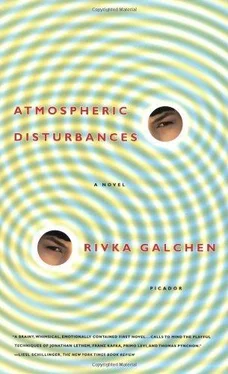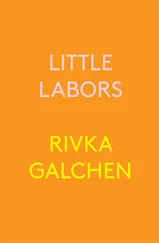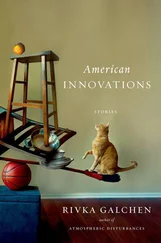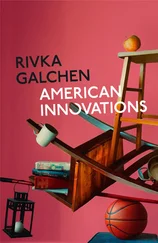But those old logics of mine had grown suddenly antique — to abandon them for something new was only reasonable.
I sat myself down at one of the library’s long communal tables. I pulled the beaded cord of the desk lamp. I stared at the illuminated green lampshade. I was waiting not for me to come up with an idea but for an idea to come up with me. This went on for a while, how long I am not sure. As I sat there, attempting patience, I became conscious of a faint ringing just quieter than the ventilation system, an alternating two-tone ringing of irregular rhythm. Looking around failed to reveal if anyone else heard this, or was disturbed by this, or if it was just me.
Along the spine of the long table lay stunted pencils and old beige card catalog cards. I watched myself write — the lead of the pencil was soft and pressing it down against the note card inevitably made me think of Rema applying eyeliner, her gaze up and out — one term on each of three separate note cards: LEO LIEBENSTEIN (ME), DOPPELGANGERS, ROYAL ACADEMY OF METEOROLOGY.
A plan came to me: to select a note card at random and to begin my research in the direction thus dictated. Again I stress, it is precisely because I am intensely logical that I recognized that in order to determine how best to proceed I needed a new kind of logic.
I had not, however, abandoned my faith in experimental controls. I quickly wrote three more note cards: HERONS, WOOL PROCESSING, HEMOCHROMATOSIS. Those would be my red herrings. Maybe I’d chosen herons with that obscurely in mind. Regardless, I turned all six note cards over and shaped them into a stack, shuffled them, then spread them out on the table. It was difficult for me to convince myself that I didn’t still know which card was which, so I gathered the cards into a pile again, then left for the men’s room, where I washed my hands with horrible bubblegum pink liquid soap and dried my hands on mealy paper towels.
This picking of the card would have to be truly, not just apparently, random. Otherwise I ran the risk of being guided by plans that only seemed like my own but that were actually determined by whatever ideas had been seeded into the air, intruded upon me.
I returned to the table; I shuffled the cards once more. Sitting across from me was a double-chinned, mustachioed man; he didn’t even glance at me but his left hand kept drifting to just behind his ear, to rub something there, and this somehow made me feel self-conscious and awkward and ugly, as if he were me. Leaving the cards scattered, I rose once more from my seat — the sound of my chair scraping the floor reverberating in the belly of that whale, of course I had doubts — and I took a walk down the long center aisle, looked at a spine on a book shelved at the far wall (Who’s Who in Scandinavia, 1950–1970) , touched the gold lettering like a home base, then returned — in that cavern — to my seat.
The mustachioed man’s hand was again behind his ear. His earlobe was large and pale, but the antitragus was bright red.
I re-reshuffled my sense and nonsense cards, re-redistributed them across the table in front of me, and, finally, picked one. I turned it over: ROYAL ACADEMY OF METEOROLOGY.
No red herring!
So: I would do a literature search on the Royal Academy of Meteorology.
12. My second search, objective unknown
Only very briefly did I panic, when, in my aloneness, I realized that the one reference database I knew how to use, besides the now dead and dismembered card catalog, was Medline.
That realization, being surprised by my own inability, shook me up in a way that reminds me of the first trip Rema and I took together, walking hut to warm hut in the Austrian Alps. This was relatively early on in our relationship, and I had told Rema that I knew German “more or less.” In truth I’d once taken a two-week German class. I’d retained maybe four phrases: milch bitte, Ich bin ein Berliner, die Zukunft einer Illusion , and Arbeit macht frei . But I wasn’t quite lying to Rema when I’d said I knew German “more or less,” because I did truly feel that once I got to Austria I would “remember” German. We need to develop a better descriptive vocabulary for lying, a taxonomy, a way to distinguish intentional lies from unintentional ones, and a way to distinguish the lies that the liar himself believes in — a way to signal those lies that could more accurately be understood as dreams. Lies — they make for a tidy little psychological Doppler effect, tell us more about a liar than an undistorted self-report ever could. Well, I thought I’d remember German despite having never actually forgotten it, having never — as I vaguely felt I might have — listened to German radio broadcasts, or spoken German as a child. But we get these wrong feelings sometimes, feelings like articles slipped into our luggage but not properly ours. I think of it like vestigial DNA. Code for nothing, or the wrong thing, or for proteins that don’t fold up properly and that may eventually wreak great destruction. I talked about this wrong luggage thing with the simulacrum the other day, explained to her how maybe she really did feel that she loved me, as if she were actually Rema, and not just “Rema.” Anyway, at the desk of our pensione that evening, I opened my mouth and was genuinely shaken to realize that no German words came to mind.
“Help finding?” I said, leaning over the reference desk.
“Collected papers?” the gentle fernlike woman there answered me. She then tapped on her computer, then wrote something down, then translated from one call-number system to another call-number system, to a particular location, and then, taking me almost by the hand, she delivered me to five oversized, clothbound aquatic blue volumes of compiled papers from the past twenty years of annual conferences of the Royal Academy of Meteorology.
“I’m eternally grateful,” I found myself saying.
The fern nodded politely, but I could see she appeared little interested in the investigation into which she had launched me. She didn’t even ask me if I was a meteorologist. She padded away, as if I were utterly forgettable to her.
Not knowing what else to do, feeling perhaps overly bereft after my fern friend left, I took one of the volumes in hand, sat myself down on the floor. The light was on over my aisle alone, and I could hear its ticking, as if it were on a timer, which maybe it was. I began to hum a little Rema ditty whose words I could not recall, began to turn thin newsprinty pages, then more and more pages, somewhat randomly, not one by one— -flipping through, I believe they call this , some part of me said to the other parts, as if to diminish by chattiness, by music, by anything, the sense of serious portent I felt taking me over. The tiny font of captions, the murmurous italicizations of abstracts, the pridefulness of columns, the unassuming data plots. Hearing those thin pages micro-skid across the grooves of my finger pads was such a comfort I almost forgot my original purpose; that almost forgetting was probably a comfort as well.
I’d thought you didn’t even love her that much anymore , some part of me taunted. Some parts of me are so mean.
Suddenly I was looking at something beautiful. Or something beautiful to me, though I couldn’t say why, something that seemed potent with form, but a form I could not classify. Intrusive beauty, like the cornsilk of Rema’s hair — which is not necessarily unanimously considered beautiful, streaky as it is, and uneven, and sometimes greasy — a mesmerizing, unsolved kind of beauty. An irritant, actually. Something irritatingly beyond category — sublime, the melodramatic might say.
I can reproduce the image here. But I’m unable to reproduce the effect, the effect the image had on me, which was, well, uncanny, like those dolls whose eyes seem to follow you around a room. I felt like I had seen the image before, though what are the chances? Beauty, maybe the sublime, and déjà vu combined, is that what stopped me? Like I was looking at a topographical map of a landscape I knew only from close up. Some sense of concordance, and meaning, of a pattern both inscrutable and yet, at some almost cellular level, detected. I wonder: if I saw my own DNA denaturing in some petri dish, would I experience the slightest spine tingling of recognition? What if I passed my father on the street, would I recognize him, or him me, or would we just have an uncanny feeling, one that we might or might not ever decode?
Читать дальше
Конец ознакомительного отрывка
Купить книгу












